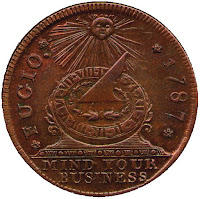Coins
The standard trade coin of the empire is the silver dollar, a large coin that's hard to come by on the frontier. (It's the size of the old Spanish dollar, an old US silver dollar, or a British 5 pound coin: 1 1/2" = 38mm across.) |
| Spanish dollar. (Mike Peel) |
One dollar is a fair amount of money, buying you:
- a pound of tea
- an axe
- a sheep
- enough powder and shot to fire a musket 20 times
A shilling is worth:
 |
| Massachusetts shilling. (British Museum) |
- one person's passage on a ferry across a river
- a supper of bread and cheese at a tavern
- half a day's labor
- about a week's worth of candles
A penny isn't worth much:
 |
| "Mind your business" penny. |
- the toll for crossing a bridge on foot
- a single biscuit
- half a gallon of cider
- three ounces of tobacco
A doubloon is quite a lot of money, so much that you're going to have trouble finding anyone who will accept one as payment:
 |
| Spanish doubloon. (Goldberg Coins) |
- a flintlock musket
- an ox for pulling a cart
- a silver pocketwatch
- a fine saber
Paper Money
If you want to make a large purchase, you don't carry a sack of heavy, jangly coins. You pay with a promissory note. |
| A note redeemable for two New York shillings, by order of the corporation. |
These are basically IOUs, notes promising to pay someone with real coins later on down the road. An IOU from a well-known bank in a prosperous city might be easily trusted. A note from a notorious swindler isn't worth the paper it's printed on.
Many of these are like checks, where you write the name of the recipient on the note so the bank knows who to give the coins to when they cash it in. Paper money could change hands many times before it actually gets turned in for coins at the bank, so a single note might have been signed over to many different parties on the back. Cashing in one of those will take some time, as the bank needs to verify all the signatures.
Some paper notes are good for whoever holds them, with no signature needed. Many banks and companies issued these before the fall; only some of them are worth anything today.
So when someone offers to pay you a substantial sum for a job, make sure you know how they're going to pay. A thousand dollars in silver coins sounds handy, but it weighs over 60 pounds (28 kg) and makes a lot of noise. A promissory note for a thousand dollars that's been signed over to many different people is going to take some serious effort to cash in.
Trade
Of course, most people don't have much money in coins or in paper notes. They deal in trade. Head down to the trading post and they'll have all their prices listed in dollars, shillings, and pennies, but they might not have any actual coins on hand. |
| At the trading post. (Angus McBride) |
The trading post pays a dollar for a cord of firewood, but only in trade. You drop off the firewood and pick out something nice that's worth a dollar. But this is the frontier, not town, so manufactured goods are more expensive and wilderness goods are less.
(You can also run up a tab, if the shopkeeper trusts you. But that's for settled people, not rough and tumble adventurers always on the move.)
No comments:
Post a Comment